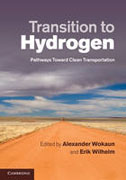
Transition to hydrogen: pathways toward clean transportation
Wokaun, Alexander
Wilhelm, Erik
This book is a comprehensive and objective guide to understanding hydrogen as a transportation fuel. The effects that pursuing different vehicle technology development paths will have on the economy, the environment, public safety and human health are presented with implications for policy makers, industrial stakeholders and researchers alike. Using hydrogen as a fuel offers a possiblesolution to satisfying global mobility needs, including sustainability of supply and the potential reduction of greenhouse gas emissions. This book focuseson research issues that are at the intersection of hydrogen and transportation, since the study of vehicles and energy-carriers is inseparable. It concentrates on light duty vehicles (cars and light trucks), set in the context of other competing technologies, the larger energy sector and the overall economy. The book is invaluable for researchers and policy makers in transportation policy, energy economics, systems dynamics, vehicle powertrain modeling and simulation, environmental science and environmental engineering. INDICE: 1. Introduction Warren Schenler; 2. Life cycle assessment of hydrogen production Andrew Simons and Christian Bauer; 3. Technical characterisation and multi-criteria analysis of light-duty vehicles Erik Wilhelm; 4. Hydrogenemissions to the atmosphere from industry and transportation Steven W. Bond, Robert Alvarez, Stefan Reimann, Martin Weilenmann and Brigitte Buchmann; 5. Regional fleet simulation Silvia Ulli-Beer, Matthias Bosshardt and Alexander Wokaun; 6. Long-term scenarios of the global energy and transport system Timur Gul and Hal Turton; 7. Integrated assessment of hydrogen in transportation Alexander Wokaun.
- ISBN: 978-0-521-19288-0
- Editorial: Cambridge University
- Encuadernacion: Cartoné
- Páginas: 272
- Fecha Publicación: 06/10/2011
- Nº Volúmenes: 1
- Idioma: Inglés
